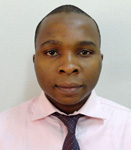
“He Who Laughs Last, Laughs Best”: Moving Past Obstacles to Strengthen the Health Workforce in Nigeria
 My recent journey to Imo State, Nigeria parallels the risks and difficulties that health workers endure while working in challenging environments in developing countries—yet with persistence and commitment, they are able to create structures for delivering quality health services.
My recent journey to Imo State, Nigeria parallels the risks and difficulties that health workers endure while working in challenging environments in developing countries—yet with persistence and commitment, they are able to create structures for delivering quality health services.
In my case, I was traveling with a group to further efforts to strengthen human resources for health (HRH) at the state level. My team set out on a journey that would ordinarily take less than two hours but instead turned into 24 hours.
First, here’s a little background: to increase the availability of health workers to meet the health needs of underserved populations in Nigeria, CapacityPlus is supporting the Federal Ministry of Health and others to carry out an integrated program of HRH strengthening activities. As part of our strategy to scale up activities at the state level, I joined the chief of party and the HRH lead at the Federal Ministry of Health on a visit to Imo State, located in the South-Eastern part of the country. We aimed to engage the state to conduct an HRH situation analysis prior to developing the state’s HRH strategic plan. It was also an opportunity to conduct a human resources information systems (HRIS) assessment and install iHRIS Manage for managing their health workforce.
Now, on with the journey: our flight out of Abuja was scheduled for 12:00 p.m. At the airport, we were informed that it was rescheduled, and we chose to take a flight to neighboring Rivers State later that day. Plagued with further delays, we finally departed at 7:00 p.m. On arrival, we were delayed for another hour waiting for our luggage. At last we left the airport in search of a hotel, and had our first meal of the day at 11:00 p.m.
Our team left for Owerri, Imo State, at 7:00 the next morning in a state government taxi. The driver was friendly, and we discussed the politics of the state, the economic challenges, and rapid growth of the city. As the vehicle ran through the thick green mangrove vegetation of the South-Southern part of the country, we noticed armed military men guarding construction companies and workers. The driver explained that this was because of recent kidnappings of construction workers and oil workers.
We saw locals along the roadside selling fresh fruits and other farm products. We decided to get some of the roasted maize, pear, and coconut for our breakfast—this pause turned out to be our saving grace. A minute after taking off, we witnessed an abnormal scene of a police vehicle speedily coming in our direction. Our experienced driver immediately reversed and followed the police vehicle. We stopped after a safe distance, and our driver positioned the car for a swift getaway if needed. We were informed that armed robbers had blocked the road a kilometer away. Imagine our surprise seeing armed police officers fleeing from robbers instead of fighting them! As minutes went by, armed military men stationed at one of the construction companies drove in the direction of the robbers. We heard a series of gunshots, apparently to scare the fleeing robbers.
Arriving at Owerri, we checked into a hotel and hurriedly took a taxi to our meeting with the state commissioner for health.
We arrived at the State Ministry of Health office a few minutes before the 11:00 meeting and received a nice reception from the state director of planning, research, and statistics (DPRS). He took us to the office of the state commissioner for health. The commissioner was in an emergency meeting with the state governor and we were asked to wait. We went back to the DPRS office and continued discussions about our mission.
The DPRS pulled strings behind the scenes, and my team finally met with the commissioner. Around 4:00 p.m., the state commissioner of health arrived. We explained our mission and he responded, “No partner has offered such a package to the state before now, and the state is very much willing to partner with the CapacityPlus team for a state HRH plan development and HRIS system.”
My team was full of smiles, relieved to have had a successful trip despite the challenges—just like the saying, "He who laughs last, laughs best." Although we faced difficulties and risks to establish this collaboration with the State Ministry of Health, the encouraging reception we got at last made us forget the trying times of the past 24 hours.
CapacityPlus’s work to support the development of a state HRH plan and the deployment of iHRIS Manage will ultimately enhance evidence-based health workforce planning and management, in line with the Millennium Development Goals. This brings me back to the comparison I made at the beginning: we made our way through a challenging environment and overcame obstacles to reach our goals, just as health workers in many countries must do every day. Their dedication to delivering quality health services inspires me to keep moving forward.
Help CapacityPlus spread the word about strengthening the health workforce. Follow us on Twitter and like us on Facebook.
Related items:
Photo courtesy of Agbonkhese Oaiya


